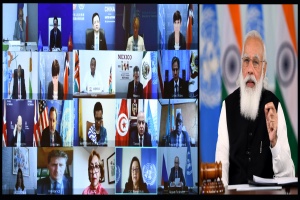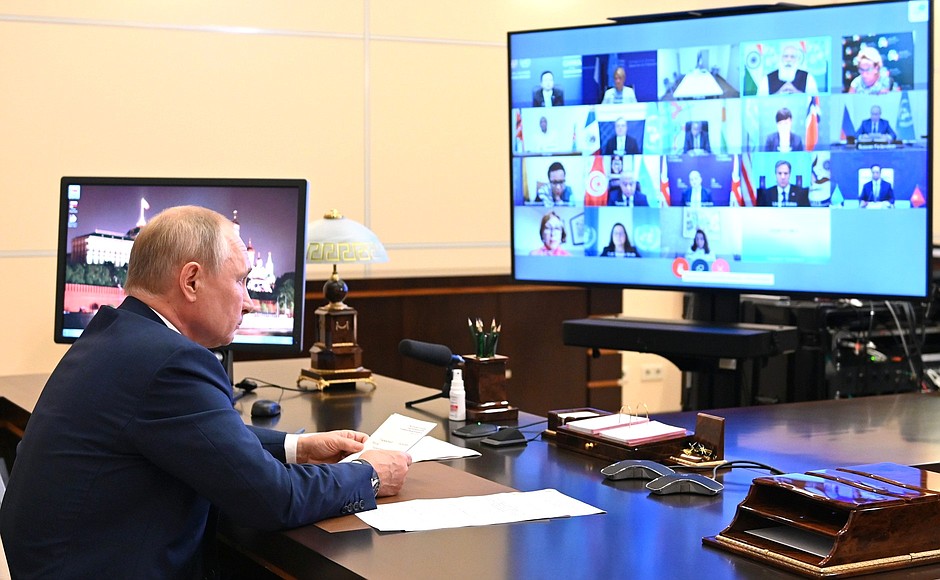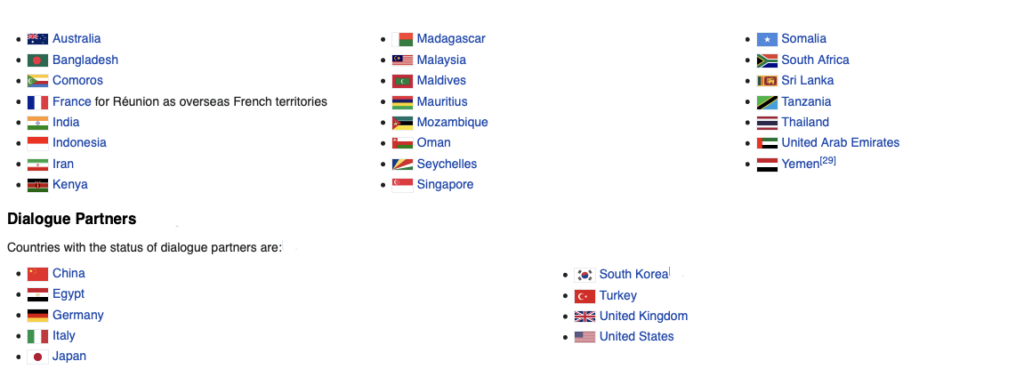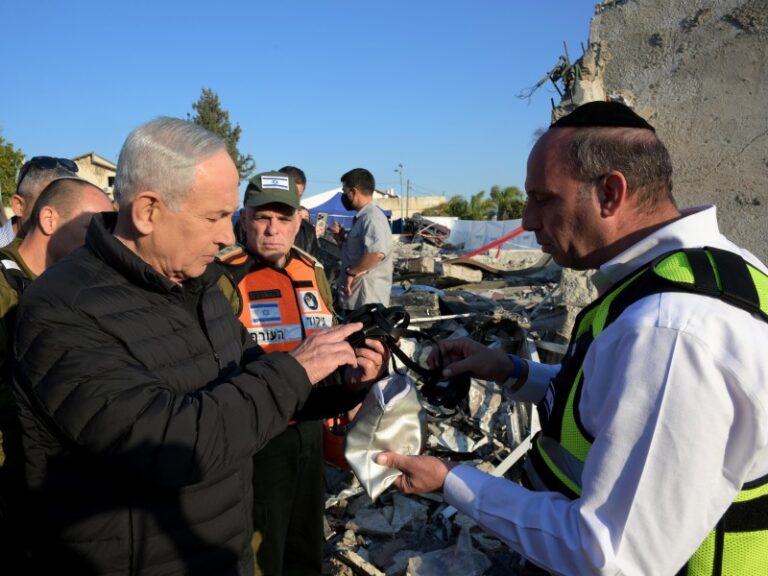
Indian Prime Minister Narendra Modi chairing the UNSC High-Level Open Debate on “Enhancing Maritime Security: A Case For International Cooperation”
Narendra Modi becomes the first Indian Prime Minister to preside over a UN Security Council Open Debate on ‘Enhancing Maritime Security – A Case for International Cooperation’.
Moscow/New Delhi: Not a part of either of the two, Russia is interested in building productive cooperation with the Indian Ocean Rim Association and the Indian Ocean Commission, Russian President Vladimir Putin said at the United Nations Security Council meeting on August 9, 2021, via video conferencing.
Putin said Russia hopes that “our partners would consider Russia’s proposal constructively”. He suggested establishing a special structure within the UN that would directly address problems related to combatting maritime crime in various regions. “At the same time, this body would rest on UN member states’ support and actively involve experts, representatives of civil society, researchers and even private businesses in its work,” he said.

According to the Russian President, the specific nature of the maritime security situation was that it was “really difficult” for some countries to defend themselves from international criminal syndicates, pirates and terrorists. “This is why there is the matter of uniting the power potential of all the interested countries’ special services and corresponding troops under the auspices of the UN,” Putin said, and added that Russia was ready to further share its experience in antiterrorist operations as well as in preventing crime, and identifying and eliminating bandit groups, including at sea.
“We believe it would be useful to regularly exchange insights and best practices in countering terrorism, armed robbery and criminal activities at sea,” he said.
It may be mentioned that the Indian Ocean Commission is an intergovernmental organisation that links African Indian Ocean nations: Comoros, Madagascar, Mauritius, Réunion (an overseas region of France), and Seychelles.It also has seven observers: China, the European Union, the Organisation internationale de la Francophonie, the Sovereign Order of Malta, India, Japan and the United Nations.
The IORA is a regional forum that brings together representatives of Government, Business and Academia, for promoting co-operation and closer interaction among them. It is based on the principles of Open Regionalism for strengthening Economic Cooperation particularly on Trade Facilitation and Investment, Promotion as well as Social Development of the region.
The Association comprises the following 23 Member States and 9 Dialogue Partners, while the Indian Ocean Tourism Organisation and the Indian Ocean Research Group have observer status:

Putin said as a leading maritime power, Russia was doing much to preserve and strengthen the international legal order as it applied to maritime security, and was “strongly” involved in activities covering the entire range of such issues both at the UN and as part of numerous regional formats, including the Contact Group on Piracy off the Coast of Somalia, the ASEAN Regional Forum and East Asian summits.
“And, of course, we are trying to help ensure security in the Persian Gulf zone and the Gulf of Guinea in the Atlantic, where cases of sea banditry with hostage taking have become more frequent,” he said and sought to “reaffirm” that the Russian Federation was committed to the common task of countering crime at sea in all its forms. “We are ready to further promote the development of equal international cooperation in this area,” he said.
Anthony Blinkin, Secretary of State of the United States, however, without naming Russia, referred to its “continued aggressive actions” against Ukraine and harassment of vessels, disrupting commerce and energy access in the Black Sea and Sea of Azov. Reaffirming support for Ukraine’s sovereignty, he said, “Crimea is Ukraine” and stressed that, when nations purport to redraw borders, they undermine the sovereign equality of Member States, a guiding United Nations principle. He further said the maritime rules were under threat in the South China Sea, where there were dangerous encounters between vessels and provocative actions to advance unlawful maritime claims. The United States and others, including South China Sea claimants, have protested such behaviour, he said and mentioned that five years ago, an arbitral tribunal constituted under the Convention delivered a unanimous and legally binding decision firmly rejecting such unlawful expansion as inconsistent with international law.
States were also unlawfully advancing interests in the Persian Gulf and the Black Sea, he said, citing the 29 July unjustifiable attack on the Mercer Street by an unmanned aerial vehicle, for which he said Iran was responsible — part of a pattern of provocative behaviour.
Incidentally, India’s maritime security initiative was appreciated by both the USA and Russia. Blinken drew attention to successful collective efforts through the Yaoundé architecture, the Nigeria-led Deep Blue Project and India’s Maritime Fusion Centre, stressing that the same coordination must be reflected in responses to illegal, unreported and unregulated fishing and to environmental disasters.
Putin lauded Indian Prime Minister Narendra Modi’s initiative to convene the UNSC meeting to debate on ‘Enhancing Maritime Security – A Case for International Cooperation’, which the former described as an “important and sensitive topic, namely, modern challenges and threats in maritime security”. He further said the Indian Prime Minster’s initiative was in line with the constructive role that India has traditionally played in the international arena, thus contributing to the promotion of multifaceted, mutually beneficial and equitable cooperation.
India holds the presidency of the UNSC in August 2021 and Narendra Modi became the first Indian Prime Minister to preside over a UN Security Council Open Debate on ‘Enhancing Maritime Security – A Case for International Cooperation’. The even had taken place at the initiative of Modi.
While Modi referred to the important part that the Oceans have played in India’s history right from the time of the Indus Valley Civilization, and called upon the members to consider removing the barriers from legitimate maritime trade, in this context he also put forward the vision of SAGAR – an acronym for ‘Security and Growth for all in the Region’.
Modi said the SAGAR vision focuses on cooperative measures for sustainable use of the oceans, and provides a framework for a safe, secure, and stable maritime domain in the region, with a focus on seven pillars of maritime security including Maritime Ecology; Maritime Resources; Capacity Building and Resource Sharing; Disaster Risk Reduction and Management; Science, Technology and Academic Cooperation; and Trade Connectivity and Maritime Transport.
Responding to Modi’s call, Putin said: “As you, Mr Prime Minister, aptly mentioned in your remarks, for us to achieve meaningful success in this area, we must unite the efforts of all stakeholders, as well as international organisations and regional associations with the central coordinating role of the UN and the UN Security Council.
“I have said it more than once and now, addressing the Security Council members, and I would like to reiterate that Russia stands for strict observance of the key norms and principles of international law enshrined in the UN Charter, such as respect for sovereignty, non-interference in internal affairs and resolution of disputes by way of dialogue,” Putin said.
The UN Security Council has discussed and passed resolutions on different aspects of maritime security and maritime crime. However, this was the first time that maritime security was discussed in a holistic manner as an exclusive agenda item in such a high level open debate.
“Given that no country alone can address the diverse aspects of maritime security, it is important to consider this subject in a holistic manner in the United Nations Security Council. A comprehensive approach to Maritime Security should protect and support legitimate maritime activities, while countering traditional and non-traditional threats in the maritime domain,” India’s Ministry of External Affairs stated.
– global bihari bureau





